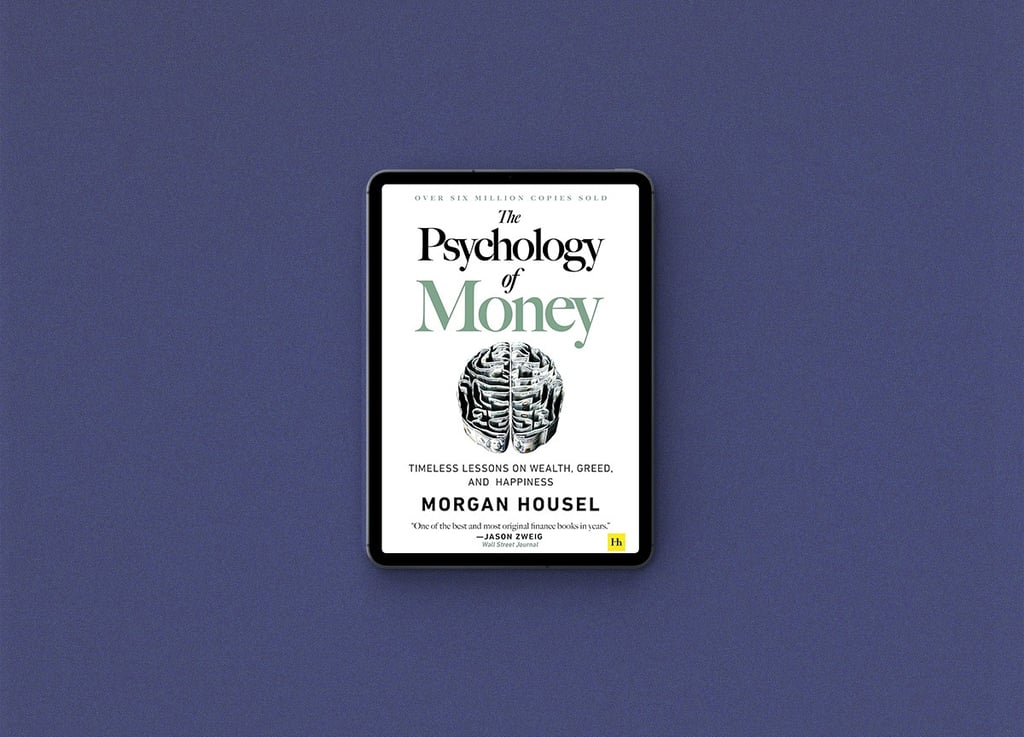New Things I Learned from Morgan Housel's "The Psychology Of Money"
BOOK HIGHLIGHTS


On having enough 🤏
1️⃣ The hardest financial skill is getting the goalpost to stop moving.
It’s also one of the most important. If our expectations rise with results, then there is no logic in striving for more because we'll feel the same after putting in all this extra effort. The desire to have more money, prestige, and power can even be dangerous - increasing ambition faster than satisfaction.
Wanting to surpass other people can fuel hard work, but life is not that fun if we never feel that we have just enough. Happiness is results without expectations.
2️⃣ Social comparison is the problem here
The ceiling of social comparison is so high that virtually no one can ever hit it. The only way to win it is to accept that we might have enough, even if it’s less than those around us.
3️⃣ ”Enough” is not too little
The idea of having “enough” might feel like leaving opportunity and potential on the table, but “enough” is actually about realising that the opposite - an insatiable appetite for more - will push us to the point of regret. Various real-world examples show that one’s inability to deny potential extra money when they already have “enough” eventually catches on to them and it’s not nice.
4️⃣ There are many things never worth risking, no matter the potential gain.
Reputation, freedom, independence, family, friends, happiness, and being loved by those who we want to love us are all invaluable things. Our best shot at keeping these things is knowing when it’s time to stop taking risks that might harm them and knowing when we have enough.
On Getting Wealthy vs. Staying Wealthy 💰
Capitalism is hard but it’s mainly because getting money and keeping them are two different skills.
Getting money requires taking risks, being optimistic, and putting ourselves out there.
Keeping money, on the other hand, requires the opposite of taking risks - it requires humility, frugality, fear that what we’ve made can be taken away at any moment, and acceptance that at least some of what we’ve made is attributable to luck.
Survival mindset:
1️⃣ “More than I want big returns, I want to be financially unbreakable. And if I’m unbreakable I actually think I’ll get the biggest returns, because I’ll be able to stick around long enough for compounding to work wonders. “
Compounding doesn’t rely on earning big returns but merely good returns that are sustained uninterrupted for the longest period of time will always win.
2️⃣ Planning is important, but the most important part of every plan is to plan on the plan not going according to plan.
A good plan embraces and emphasises that there is room for error. The more we need specific elements of a plan to be true, the more fragile our financial life becomes. So, if there’s enough room for error in our savings rate that allows us to say, “It’d be great if the market returns 8% a year over the next 30 years, but if it only does 4% a year I’ll still be OK”, the more valuable the plan is.
The margin of safety is raising the odds of success at a given level of risk by increasing our chances of survival.
3️⃣ A barbelled personality - optimistic about the future, but paranoid about what will prevent us from getting to the future - is vital.
Sensible optimism is a belief that the odds are in our favour, and over time things will balance out to a good outcome even if what happens in between is filled with misery.
On freedom 💸
The highest form of wealth is the ability to wake up every morning and say "I can do whatever I want today.”
People want to become wealthier to make them happier and to be able to control their lives. The ability to do what you want, when you want, with who you want, for as long as you want, is priceless. It is the highest dividend money pays.
The strongest sense of controlling our lives is a more dependable predictor of positive feelings of well-being than any of the objective conditions we have considered.
More than our salary, size of our house, prestige of our job… Control over what we want, when we want to, and with the people we want to, is the broadest lifestyle variable that makes us happy.
Money’s greatest intrinsic value is its ability to give us control over our time. To obtain a level of independence and autonomy that comes from unspent assets that give us greater control over what we can do and when we can do it.
A small amount of wealth means the ability to take a few days off when we’re sick without breaking the bank.
A bit more means waiting for a good job to come around after we have been laid off, rather than having to take the first one we can find - and this, of course, can be life-changing!
6 months’ emergency expenses means not being terrified of our boss, because we know we won’t be ruined if we have to take some time off to find a new job. And if we have more, then it also means that we can take a job with lower pay but flexible hours - maybe one with a shorter commute.
Then there is also retiring when we want to, instead of when we need to.
On Saving Money 👛
Wealth is just the accumulated leftovers after we spend what we take in.
One of the most powerful ways to increase our savings isn’t to raise our income but to raise our humility.
People with enduring personal finance success tend to have a propensity to not care what others think about them.
Savings can be created by spending less, and we can spend less if we desire less. We will desire less if we care less about what others think of us.
On Investment Surprises🎈
1️⃣ We’ll likely miss the outlier events that move the needle the most
E.g. The Great Depression, World War II, the dot-com bubble, September 11, and the housing crash of the mid-2000s - a handful of outlier events play an enormous role because they influence many seemingly unrelated events.
The majority of what’s happening at any given moment in the global economy can be tied back to a handful of past events that were nearly impossible to predict - so we should admit that we have no idea what might happen next and that we are not able to prepare for them.
2️⃣ History can be a misleading guide to the future of the economy and stock market because it doesn’t account for structural changes that are relevant to today’s world.
The further back we look, the more likely we are to be examining a world that no longer applies to today. Since economies evolve, recent history is often the best guide to the future, because it’s more likely to include important conditions that are still relevant to the future.
It doesn’t mean that we should ignore history when thinking about money but we should be aware that the further back in history we look, the more general our takeaways should be. Specific trends, trades, sectors, casual relationships about markets, and what people should do with their money are always examples of evolution in progress. Historians are not prophets.
On Change 🙏
We should avoid the extreme ends of financial planning. Assuming we'll be happy with a very low income, or choosing to work endless hours in pursuit of a high one, increases the odds that we’ll eventually regret it. People adapt to most circumstances, so the benefits of an extreme plan - the simplicity of having hardly anything, or the thrill of having almost everything - wear off. But the downsides of those extremes - such as not being able to afford retirement, or looking back at a life spent devoted to chasing dollars - become enduring regrets.
Compounding works best when we can give a plan years or decades to grow - which is true for careers, savings, relationships, etc.
Aiming to have moderate annual savings in our working life, moderate free time, no more than a moderate commute, and at least moderate time with our family, increases the odds of being able to stick with a plan and avoid regret.
We should also accept the fact that we will probably change our minds at some point. We shouldn't stay loyal to a career just because it’s the field we picked when we decided on a college major at the age of 18! It’s okay to want to do something entirely different after we grow and experience different things in life. Just accept this and move on ASAP.
So, we should avoid the extreme ends of financial decisions. Everyone’s goals and desires will change over time, and the more extreme our past decisions were, the more we may regret them as we evolve.
2 Things to Keep in Mind When Managing Money 📌
1️⃣ The more we want something to be true, the more likely we are to believe a story that overestimates the odds of it being true.
There are many things in life that we think are true because we desperately want them to be true - particularly in investments and the economy.
Incentives are a powerful motivator, and we should always remember how they influence our own financial goals and outlooks. It can’t be overstated: there is no greater force in finance than room for error, and the higher the stakes, the wider it should be.
2️⃣ Everyone has an incomplete view of the world. But we form a complete narrative to fill in the gaps.
Other Notes 🥁
Every job looks easy when we’re not the ones doing it and it’s because the challenges faced by someone in the arena are often invisible to those who are not in it.
Dealing with conflicting demands, regulators, unions, bureaucracy, etc. is not only hard to do but it’s also hard to recognise the severity of the problems until we’re the ones dealing with them.
***
Optimism is a belief that the odds of a good outcome are in our favour over time, even when there will be setbacks along the way.
***
Growth is driven by compounding, which always takes time.
Destruction is driven by single points of failure, which can happen in seconds, and loss of confidence, which can happen in an instant.
***
The outcome of a start-up depends as much on the achievements of its competitors and on changes in the market as on its own efforts. However, entrepreneurs naturally focus on what they know best - their plans and actions and the most imminent threats and opportunities, such as the availability of funding. They know less about their competitors and therefore find it natural to imagine a future in which the competition plays little part.
***
The advice is to become OK with things going wrong because we can be wrong half the time and still make a fortune - a small minority of things account for the majority of outcomes. It is natural to have a large chunk of poor investments and a few outstanding ones.
***
Achieving independence is a matter of keeping our expectations in check and living below our means. Independence, at any income level, is driven by our savings rate. Past a certain level of income, our savings rate is driven by our ability to keep our lifestyle expectations from running away.
Quotes 👇
“Your success as an investor will be determined by how you respond to punctuated moments of terror, not the years spent on cruise control. A good definition of an investing genius is the man or a woman who can do the average things when all those around them are going crazy.”
“It’s not whether you’re right or wrong that’s important but how much money you make when you’re right and how much money you lose when you’re wrong - you can be wrong half the time and still make a fortune.”
“No one - not a single person out of a thousand - said that to be happy you should try to work as hard as you can to make money to buy the things you want. No one - not a single person - said it’s important to be at least as wealthy as the people around you, and if you have more than they do it’s a real success. No one - not a single person - said you should choose your work based on your desired future earning power. What they did value were things like quality friendships, being part of something bigger than themselves, and spending quality, unstructured time with their children.”
“If you want to do better as an investor, the single most powerful thing you can do is increase your time horizon. Time is the most powerful force in investing. It makes little things grow big and big mistakes fade away. It can’t neutralise luck and risk but it pushes results closer towards what people deserve.”
“Use money to gain control over your time, because not having control of your time is such a powerful and universal drag on happiness. The ability to do what you want, when you want, with who you want, for as long as you want, pays the highest dividend that exists in finance”.


